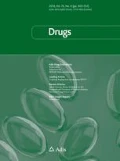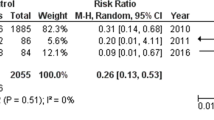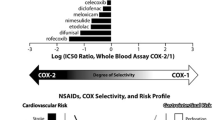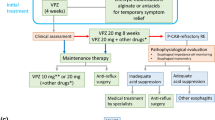Abstract
Background
Several alternative treatment regimens for Helicobacter pylori eradication have been proposed since the efficacy of standard triple therapy has declined over time, and sequential therapy is one of them. The purpose of this systematic review is to analyze and compare the efficacy, adverse effects and cost of sequential therapy with that of standard triple therapy for H. pylori infection.
Methods
MEDLINE, EMBASE, Google Scholar and Cochrane databases were used to retrieve all relevant articles published in the English language over the last 5 years (January 2008–October 2012). Eligibility criteria were randomized controlled trials (RCTs) comparing sequential and standard triple therapies in patients with documented H. pylori infection. Eligibility and quality of the trials were assessed independently by two reviewers, and the data regarding eradication rate, adverse effects and the cost of therapy were extracted.
Results
Of the 17 RCTs included in the analysis (Asia 13, Europe 3, Latin America, 1), 12 reported better eradication rates with the sequential therapy, four did not find a significant difference between the two treatment regimens, and one reported a better eradication rate with standard triple therapy. All except one RCT reported no significant difference in the incidence of adverse effects between standard triple therapy and sequential therapy. Sequential therapy was cheaper than standard triple therapy in all three RCTs where a cost analysis was performed. The limitations of the RCTs included in the systematic review were that the sequential therapy regimen and the duration of standard triple therapy were not uniform. Antibiotic susceptibility tests were performed in only three RCTs.
Conclusions
While the majority of the RCTs have shown superior eradication rates with sequential therapy, the largest RCT from Latin America did not find a significant difference between the two treatment regimens. Sequential therapy has good efficacy; however, further trials other than those from Asia and Italy are required to assess its superiority over existing regimens before recommending sequential therapy as the first line of treatment for H. pylori infection.

Similar content being viewed by others
References
Suerbaum S, Michetti P. Helicobacter pylori infection. N Engl J Med. 2002;347(15):1175–86.
Huang JQ, Hunt RH. The evolving epidemiology of Helicobacter pylori infection and gastric cancer. Can J Gastroenterol. 2003;17(Suppl B):18B–20B.
Ananthakrishnan N, Kate V. Helicobacter pylori: the current perspectives. In: Chattopadhyay TK, editor. G.I. Surgery Annual, vol 5. New Delhi: Byword; 1998. p. 1–20.
Chey WD, Wong BC; Practice Parameters Committee of the American College of Gastroenterology. American College of Gastroenterology guideline on the management of Helicobacter pylori infection. Am J Gastroenterol. 2007;102(8):1808–25.
Fock KM, Katelaris P, Sugano K, et al. Second Asia-Pacific conference. Second Asia-Pacific consensus guidelines for Helicobacter pylori infection. J Gastroenterol Hepatol. 2009;24(10):1587–600.
Malfertheiner P, Megraud F, O’Morain CA; European Helicobacter Study Group, et al. Management of Helicobacter pylori infection—the Maastricht IV/ Florence Consensus Report. Gut. 2012;61(5):646–64.
Sharma VK, Howden CW. A national survey of primary care physicians’ perceptions and practices related to Helicobacter pylori infection. J Clin Gastroenterol. 2004;38(4):326–31.
Graham DY, Fischbach L. Helicobacter pylori treatment in the era of increasing antibiotic resistance. Gut. 2010;59:1143–53.
Zullo A, Rinaldi V, Winn S, et al. A new highly effective short-term therapy schedule for Helicobacter pylori eradication. Aliment Pharmacol Ther. 2000;14(6):715–8.
Oh HS, Lee DH, Seo JY, et al. Ten-day sequential therapy is more effective than proton-pump inhibitor-based therapy in Korea: a prospective randomized study. J Gastroenterol Hepatol. 2012;27(3):504–9.
Park HG, Jung MK, Jung JT, et al. Randomised clinical trial: comparative study of 10-day sequential therapy with 7-day standard triple therapy for Helicobacter pylori infection in naïve patients. Aliment Pharmacol Ther. 2012;35(1):56–65.
Valooran G, Kate V, Jagdish S, et al. Sequential therapy versus standard triple drug therapy for eradication of Helicobacter pylori in patients with perforated duodenal ulcer following simple closure. Scand J Gastroenterol. 2011;46(9):1045–50.
Uygun A, Kadayifci A, Yesilova Z, et al. Comparison of sequential and standard triple-drug regimen for Helicobacter pylori eradication: a 14-day, open-label, randomized, prospective, parallel-arm study in adult patients with nonulcer dyspepsia. Clin Ther. 2008;30:528–34.
Nadir I, Yonem O, Ozin Y, et al. Comparison of two different treatment protocols in Helicobacter pylori eradication. South Med J. 2011;104(2):102–5.
Ozdil K, Calhan T, Sahin A, et al. Levofloxacin based sequential and triple therapy compared with standard plus probiotic combination for Helicobacter pylori eradication. Hepatogastroenterology. 2011;58(109):1148–52.
Polat Z, Kadayifci A, Kantarcioglu M, et al. Comparison of levofloxacin-containing sequential and standard triple therapies for the eradication of Helicobacter pylori. Eur J Intern Med. 2012;23(2):165–8.
Erdur B, Ozturk Y, Gurbuz ED, et al. Comparison of sequential and standard therapy for Helicobacter pylori eradication in children and investigation of clarithromycin resistance. J Pediatr Gastroenterol Nutr. 2012;55(5):530–3.
Gao XZ, Qiao XL, Song WC, et al. Standard triple, bismuth pectin quadruple and sequential therapies for Helicobacter pylori eradication. World J Gastroenterol. 2010;16(34):4357–62.
Zhou YQ, Xu L, Wang BF, et al. Modified sequential therapy regimen versus conventional triple therapy for Helicobacter pylori eradication in duodenal ulcer patients in China: a multicenter clinical comparative study. Gastroenterol Res Pract. 2012;2012:405–425.
Choi HS, Chun HJ, Park SH, et al. Comparison of sequential and 7-, 10-, 14-d triple therapy for Helicobacter pylori infection. World J Gastroenterol. 2012;18(19):2377–82.
Kim YS, Kim SJ, Yoon JH, et al. Randomised clinical trial: the efficacy of a 10-day sequential therapy vs. a 14-day standard proton pump inhibitor-based triple therapy for Helicobacter pylori in Korea. Aliment Pharmacol Ther. 2011;34(9):1098–105.
Aminian K, Farsad F, Ghanbari A, et al. A randomized trial comparing four Helicobacter pylori eradication regimens: standard triple therapy, ciprofloxacin based triple therapy, quadruple and sequential therapy. Trop Gastroenterol. 2010;31(4):303–7.
Albrecht P, Kotowska M, Szajewska H. Sequential therapy compared with standard triple therapy for Helicobacter pylori eradication in children: a double-blind, randomized, controlled trial. J Pediatr. 2011;159(1):45–9.
Bontems P, Kalach N, Oderda G, et al. Sequential therapy versus tailored triple therapies for Helicobacter pylori infection in children. J Pediatr Gastroenterol Nutr. 2011;53(6):646–50.
Paoluzi OA, Visconti E, Andrei F, et al. Ten and eight-day sequential therapy in comparison to standard triple therapy for eradicating Helicobacter pylori infection: a randomized controlled study on efficacy and tolerability. J Clin Gastroenterol. 2010;44(4):261–6.
Greenberg ER, Anderson GL, Morgan DR, et al. 14-day triple, 5-day concomitant, and 10-day sequential therapies for Helicobacter pylori infection in seven Latin American sites: a randomized trial. Lancet. 2011;378(9790):507–14.
Jafri NS, Hornung CA, Howden CW. Meta-analysis: sequential therapy appears superior to standard therapy for Helicobacter pylori infection in patients naive to treatment. Ann Intern Med. 2008,17;148(12):923–31.
Gatta L, Vakil N, Leandro G, et al. Sequential therapy or triple therapy for Helicobacter pylori infection: systematic review and meta-analysis of randomized controlled trials in adults and children. Am J Gastroenterol. 2009;104(12):3069–79.
Tong JL, Ran ZH, Shen J, Xiao SD. Sequential therapy vs. standard triple therapies for Helicobacter pylori infection: a meta-analysis. J Clin Pharm Ther. 2009;34(1):41–53.
Calvet X, García N, López T, et al. A meta-analysis of short versus long therapy with a proton pump inhibitor, clarithromycin and either metronidazole or amoxycillin for treating Helicobacter pylori infection. Aliment Pharmacol Ther. 2000;14(5):603–9.
Fuccio L, Minardi ME, Zagari RM, et al. Meta-analysis: duration of first-line proton-pump inhibitor based triple therapy for Helicobacter pylori eradication. Ann Intern Med. 2007;147(8):553–62.
Zullo A, De Francesco V, Hassan C, et al. The sequential therapy regimen for Helicobacter pylori eradication: a pooled-data analysis. Gut. 2007;56(10):1353–7.
Zullo A, Hassan C, Ridola L, et al. Standard triple and sequential therapies for Helicobacter pylori eradication: an update. Eur J Intern Med. 2013;24(1):16–9.
Moayyedi P, Malfertheiner P. Editorial: Sequential therapy for eradication of Helicobacter pylori: a new guiding light or a false dawn? Am J Gastroenterol. 2009;104(12):3081–3.
Acknowledgments
Declaration of personal and funding interests: None. Conflicts of interests for all authors: None. The authors thank Dr. Phani Kumar, Junior Resident, Department of Surgery, for overall assistance in preparation of the manuscript.
Author information
Authors and Affiliations
Corresponding author
Rights and permissions
About this article
Cite this article
Kate, V., Kalayarasan, R. & Ananthakrishnan, N. Sequential Therapy Versus Standard Triple-Drug Therapy for Helicobacter pylori Eradication: a Systematic Review of Recent Evidence. Drugs 73, 815–824 (2013). https://doi.org/10.1007/s40265-013-0053-z
Published:
Issue Date:
DOI: https://doi.org/10.1007/s40265-013-0053-z




